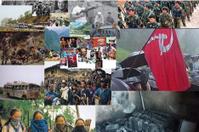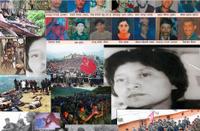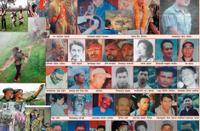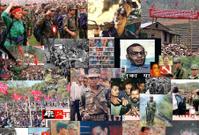




These are the things the Maoists themselves have said:
- That their ultimate goal continues to be a classless utopia, but that the goal could take a hundred or more years to realize.
- That even if they were to come to power, their transformation of the state to that end would be peaceful. They basically are ditching the Mao line that power flows through the barrel of a gun.
- As to how to come to power. Their first choice is to get the seven parties to come along for a common goal of a Democratic Republic. If that be not forthcoming, they are willing to settle for a Constituent Assembly to draw a new constitution for the country, and if the Assembly were to keep a Constitutional Monarchy, they will be fine with that.
- Whether or not to go for a Constituent Assembly. The parliamentary parties, especially the two big ones, were not for the idea for the longest time. But now they have come around to it. But the Monarchists are still not for the idea. As to how to get the Monarchists to come around to it remains a struggle. The longer the Monarchists hold on, more they stand to lose.
- How to enter the Constituent Assembly. Here the Maoists are unclear. They are going to have to disarm for that. As to how to disarm, on that point I myself am unclear. But I am open to the idea of third party mediation. Disarming can be done in several ways. And of course the army will have to be sent back to the barracks before elections can take place.
- Who will conduct those elections? I think an interim government should. Here Girija has been posing a problem. This whole House revival thing has the ring of a Baptist revival.
On their part, all the above stands of the Maoists have only been taken by the central leadership. They of all people need to understand they need to adopt their new platform through a party convention. They, after all, have taken a fundamental departure from classic Maoism. That has to be formally codified. Because if they don't, they are making it hard for people like me who have been working against the global demonization of the Maoists to make headway. If the Maoists do now believe in the peaceful tools of state power, how come they have not said as much in any of their authoritative documents? That is a valid point.
Whichever camp - the Maoists or the democrats - takes greater initiatives to engage in trust-building measures now will reap the larger rewards once peace is achieved. Because the Nepali people sure are watching. And they do understand.
The Maoists should not become enemies to their steps 3,4,5 and 6 by not getting creative with steps 1 and 2. And if they do take the lead, they stand a strong chance of emerging the largest party within a multi-party framework. After all, is that not what they want?
It is like the Gagan Thapa dilemma. He has the guts to challenge the king for the democratic cause, but he gets confused when it comes time to challenge Girija's autocratic ways inside the Congress.
The Maoists have been willing to die for their cause. But now when their goal is in sight, will they make some smart, peaceful moves to make all those sacrifices worth it?
The current political paralysis has to be undone. One camp has to take the initiative.
Some of the things the Maoists could do to seize the initiative:
- Engage the cadres of the seven parties at the local levels in dialogue. Prove that they can work freely wherever. For this you do not need the permission of the central leaders of the seven parties.
- Call for a party convention to adopt the new party program of a peaceful transformation.
- Halt the military campaign, and aid the seven party agitation in all the urban areas. By just staying out of the way.
- Start training your cadres for the transition. Peaceful grass roots organizing is different from wielding the gun. Teach them new skills.
The UML is about to totally go republican. The Congress is heavily tilting that way. But neither of them will ever compromise on the basic disarmament issue.
In The News
- Seven-party meet to continue Monday NepalNews Nepali Congress (NC) president Girija Prasad Koirala, CPN (UML) general secretary Madhav Kumar Nepal, NC (Democratic) acting president Gopalman Shrestha, Nepal Workers and Peasants Party (NEPP) chairman Narayan Man Bijuckche and Nepal Sadbhawana Party (Anandi Devi) general secretary Hridayesh Tripathi and United Left Front’s Chandra Prakash Mainali attended the meeting.
- UML meet continues NepalNews ..... the UML leaders stressed that the party should opt for a democratic republic...... Jhala Nath Khanal, reportedly, demanded that the party go for an early general convention so as to reorganize it from an ideological, political, theoretical and organizational point of view.
- NC Leaders Suggest Organizational Reform Kantipur ..... pressed for the election of 75 percent of central working committee members, including vice-president of the party..... Currently, NC general convention elects 50 percent of the central committee members and the rest are nominated by the party president...... also suggested reservation for underrepresented groups— women, Dalits, Janajatis and people from underdeveloped regions— in the party's central committee. ..... Ram Chandra Poudel, Narahari Acharya, Dr Ram Saran Mahat, Arjun Narsing KC, Mahesh Acharya, Lila Koirala, Aamod Prasad Upadhaya, Radheshyam Adhikari and Chandra Bhandari..... the party's central committee members be given more responsibilities in party activities to decentralize power traditionally concentrated in the party president. ....... election of the vice-president in the party would clear the line of leadership succession for the future....... Narahari Acharya suggested that Koirala should clear the way for younger leaders to contest for the party presidency. He also informed Koirala that he would contest for the presidency.
